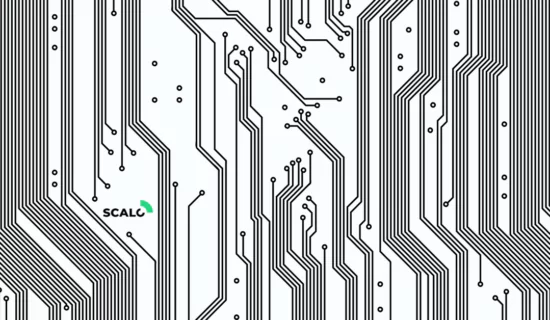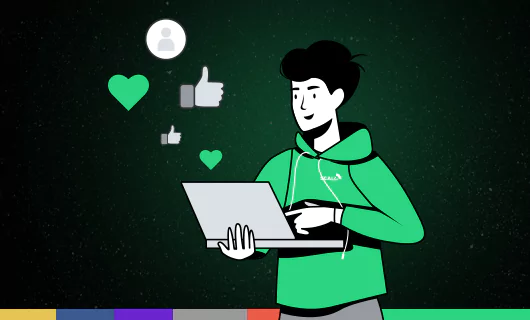I assume you’ve come across this blog post, looking for simple and informative answers to the most searched questions regarding the ‘what’s,’ ‘how’s,’ and ‘why’s’ of Delivery Management in Software Development. Without further ado, we’ll explain the basic concept of the role and critical responsibilities and add a pinch of everyday insights from our Delivery Managers.
What does a Delivery Manager do?
The Delivery Manager (DM) is a middleman, an expectation manager, and a diplomat. They are the contact point between clients, software developers, and the Recruitment department. The fundamentals of a Delivery Manager role come down to overseeing the product delivery process for the company’s developers and clients.
On the client’s side, the essential duties of a Delivery Manager include ensuring accuracy and timeliness, coordinating the developers, managing budgets and delivery within the given timeframe. On the team side, a delivery manager takes part in the hiring process, evaluates candidates’ performance, and takes care of devs morale by managing the needs and expectations of the team members. Software engineers being mismatched to projects tend to turn unhappy and less productive with time. Although completely understandable, if not addressed on time, it usually leads to devs leaving the company in search of new challenges. This is where a Delivery Manager steps in as a negotiator for those needing a change of project or a raise and will strive to keep the team happy and to work within the organization, an enjoyable experience. Avoiding replacements and boosting performance is crucial in the IT market, known for the shortage of talents.
What does a Delivery Manager do daily?
To give you a better overview, we’ve gathered some of the key responsibilities of a Delivery Manager in Software Development Industry.
- Reviewing customer request
- Planning delivery activities and solving issues according to the timeline
- Managing good relations with the customers to ensure business growth
- Performing staff allocations and tasks assignments
- Maintaining the team needs
- Evaluating the performance of team members and candidates
- Being a communicator for customer and development team inquiries
- Conducting negotiations for delivery rates.
- Making business decisions to meet customer expectations
- Reporting delivery status to customers
- Maintaining proper delivery documentation
A couple of Delivery Manager challenges
Delivery Management involves a lot of Incident management, context switching, and troubleshooting various potential issues in a couple of projects simultaneously. It requires keeping the existing developers within the organization, managing customer’s business, and ensuring growth for both sides. As said before, a DM is also a negotiator and a diplomat. Delivery managers naturally become the bearer of bad news from stakeholders and developers The conditions might and will change rapidly, which demands an Agile approach and an experienced manager to keep the numbers right.
Today’s IT software development experts undoubtedly rule the market. Developers, fully aware of the shortage of talents and profits they can generate, set the rates higher each quarter. At the same time, there is a noticeable downtrend in the quality of the programming work you can get for the same rate in comparison to the situation in previous years. On the other hand, the budgets for hiring skilled developers grow slower than expectations from the client. Combining both puts recruitment and delivery managers between a rock and a hard place.
It takes a highly motivated and well-organized professional as there are no visible effects of the Delivery Manager’s work. A significant part of the work is maintenance and protecting the company and the client from what might have happened if there was nobody to take care of the inquiries. Although the job is gratifying, it takes a market-aware individual to appreciate the work of a skilled DM and the benefits they bring to the table.
Delivery Manager vs. Project Manager - what is the difference?
Project management focuses on managing and completing projects and achieving fixed goals within a given timeframe. In contrast, delivery management is a type of management that focuses on applying processes to ensure that the product is delivered effectively and efficiently. Project managers are familiar with any technical aspects of a project so they can communicate the product’s features and requirements to the team and stakeholders in the company. Similarly, delivery managers involved in technology become familiar with the current technical standards of a company to continue creating software that suits their computer architecture or brand. When a project manager’s project is not completed according to the agreed-upon specifications, the project manager must answer to the stakeholders. Delivery managers, when a product is not completed on time, are the ones who hold the team accountable.
Project Manager:
Accountable for specific projects
Accountable for timeliness and delivery
Responsible for project budget
Measures the entire project delivery
Fixed term/Duration of the project
Delivery Manager:
Accountable for teams ongoing deliveries and people within the teams
Responsible for budgets within their team
Recruitement, line managament, team morale, career progression
Long term/Relation management
How can I become a Delivery Manager
If you’re interested in becoming a delivery manager, one of the first things to consider is how much overall IT experience you have. Several years of industry experience are usually required to become a Delivery Manager, as well as complementary (secondary) education in a relevant field. Senior Developers with extensive experience working with Agile methodologies in IT teams may also consider a transition into a Delivery Manager role. Becoming a Delivery Manager requires a good understanding of the market state and its ongoing needs. Good communication skills and business oriented approach are another must-have when looking for a job in Delivery Management. Having a technical background is not a must but will let you better understand the project’s scope, ask the candidates the right questions and understand your team better.





